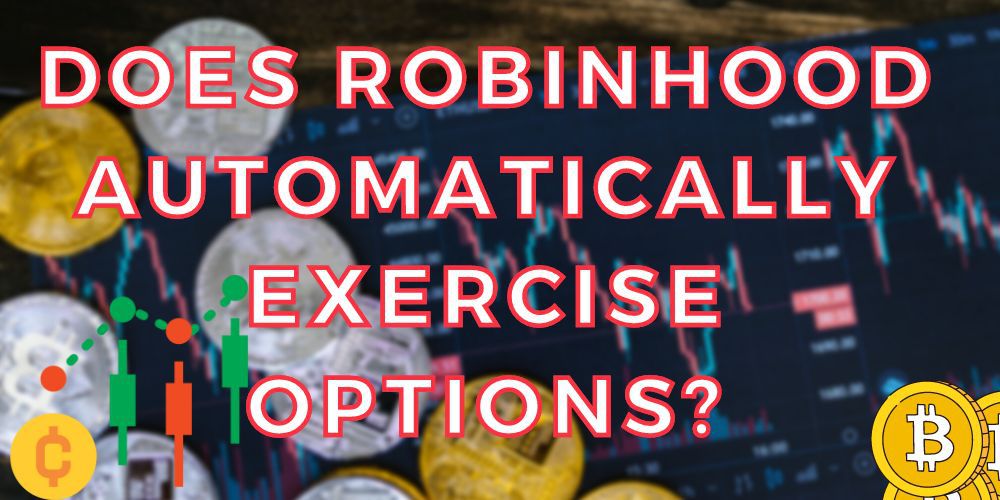What happens if you let your options go to expiry on Robinhood? Does Robinhood automatically exercise options for you, or do you need to provide separate instructions? We went deep into Robinhood’s options expiry guidelines, and below is the answer.
Does Robinhood Automatically Exercise Options?
Yes, if the option is in the money (ITM), it will be exercised automatically on the expiration date. We will explain in-the-money in the next section.
If you don’t want this to happen, doing an early exercise manually is best. To do this, navigate the options detail screen and select “Exercise.”
The app will direct you toward the next steps needed.

Note that any request to do this will be immediately submitted if placed between 9 am ET and 4 pm ET on any day before the stock expires.
If the investor exercises the option but changes their mind later, they must contact the Robinhood team before 5 pm on the same day to cancel the request.
On the expiry date, the last time until which the option can be exercised is before 4 pm ET. To do this, one would need to contact the Robinhood team.
Related: The 9 Best Robinhood Penny Stocks
What Does In-the-Money Mean?
Options can be of two types: calls and puts. A call is a right to buy a stock at a predecided price, whereas a put is a choice to sell.
In either case, it is a right, not an obligation – the investor can choose to do nothing about it.
For a call option, in-the-money (ITM) means that the current stock price is higher than the strike price. The trader can buy the stock at a lower price than its prevailing rate and sell for a profit.
For a put option, ITM indicates that the strike price is higher than the current market price.
Hence, the option buyer can sell the stock at the strike price, repurchase it at market price, and gain from the price difference.
If neither of these two is applicable, the option contract is said to be out of the money (OTM). This indicates that exercising will be worthless.
Note that ITM does not incorporate share commissions involved in the process. It only tells whether exercising the option will make money from a share price differential.
The trader might end up losing money despite the option being ITM because the commissions are too high for the profits to cover.
What Time Do Options Expire on Robinhood?
At 4 pm ET on the expiry date, if the option is out of the money (OTM), it expires.
If it is in the money (ITM), Robinhood will try to exercise it. However, in three cases, this may not work out.
If the owner of a call option does not have sufficient buying power, exercise requests will not happen.

In the case of put options, Robinhood will not go through with it if it results in a short position.
Lastly, the trader can wilfully request not to exercise the option before the cut-off time, which is 5 pm EST on the expiration day.
There is another way to avoid this: the option can be rolled over to a later date.
To do this, the investor has to place a request to Robinhood before the last hour of trading on the expiry date.
When this happens, the position will be closed, and a new one will be automatically opened for a later date.
Note that this facility is only available on margin accounts.
What Happens if You Don’t Sell Options Before Expiration?
As explained earlier, if the option is OTM, there is no impact if the sale does not happen before expiration.
If it is ITM, and the trader does not sell them, most brokers like Robinhood will automatically try to sell it in the last hour of trading.
However, there is a possibility that the broker cannot sell the option, and the contract is a compulsory delivery one.
In this case, the investor might get into trouble. The contract will be exercised, and they will have to either buy (call option) or sell (put option) the underlying stock at the strike price.
If they do not have the required capital to execute the trade, there will be a significant penalty for breach of contract.
Should I Let My Options Expire?
No, it is always best to make a decision on the option prior to expiry.
If the contract is OTM, it expires worthless, and there is no harm. But if it is not, the closer the option gets to the expiry date, all other things being equal, the lower its value will be.
This happens because the option’s time value declines. Let us explain this below.

An option’s value consists of two parts: intrinsic value and time value. Intrinsic value is simply the difference between the current price and the strike price.
Time value is the premium that the option buyer pays for the likelihood that the underlying stock price will move significantly higher.
The buyer of an option is essentially hoping for the underlying stock to go as high as possible above the strike price and make the maximum profit.
As the time to expiry reduces, the probability of a big swing in the share’s price keeps reducing. This causes the time value to always decrease, no matter how the stock is doing.
For example, consider an options contract with a 60-day expiry, a current share price of $10, and a strike price of $9.
In sheer number terms, the option’s intrinsic worth should be the difference between the share price and the strike price, i.e., $10- $9 = $1.
However, the buyer is not buying the contract based on the $1 profit they see today alone.
Their hope is for the stock to go to $15, $20, or even higher in the coming 60 days. The time value of the option is how much this likelihood is worth in the eyes of the market.
It is a premium that the contract maker charges the buyer for the possibility of a big swing in price.
Now think about what happens if 59 days elapse and the stock is still at $10. It is extremely unlikely that the security can suddenly swing to $20 on the last day!
Since the likelihood of any major swing has fallen significantly, the same option will now sell for a much lower price – its intrinsic value is still $1, but the time value has fallen.
Do I Owe Money if My Call Option Expires?
No. If the option expires out-of-the-money, it is worthless, and you lose the entire premium paid for it.
If it is ITM, the broker will try to sell them, and the profit (after deducting commissions) will come to your account.
In some cases, the sale may not happen, which forces the dealer to exercise the option. In this case, you might owe money.
Do All Options Expire at 0?
No, only out-of-the-money options expire at zero. This includes call options whose strike price is higher than the current share price and put options whose strike price is lower.
For options in the money, the seller of the contract will have to pay the difference between the two prices to the buyer at expiry.
What Happens if You Can’t Afford to Exercise an Option?
If you either don’t have the money to exercise a call option or enough stock to sell in order to satisfy a put option, the broker might do a partial exercise.
For example, in the case of Robinhood, this is what happens:
Supposing the investor has ten call options but buying power enough to only take four shares. In that case, Robinhood tries to buy the four and sell the remaining options.
If it is put options, and the trader has only four stocks in their account, Robinhood will exercise the put for those four stocks and dispose of the other options.
When neither of these is possible, they will submit a Do Not Exercise request with the Options Clearing Corporation, and the options will be allowed to expire worthless.
Is It Better to Exercise or Sell an Option?
Most options are not exercised but rather sold in the market. Selling the option is possibly a more reliable way of making a profit.
As mentioned earlier, the time value of an option keeps falling as it nears expiry. Hence, other things being equal, it is better to sell it off earlier.

Exercising the option is advisable only if there is a high likelihood that the share will continue to rise till the expiry date.
However, since there are no guarantees in the stock market, making such a call is nearly impossible.
How Late Can You Sell Options on Robinhood?
Options trading can be done during pre-market hours (7–9:30 am ET), normal hours, and after hours (4–8 pm ET).
The timings are the same as that for share trading.
On the expiration day, the option has to be sold before the market closes. If not, and the contract expires in the money, the process followed will be as explained earlier.
Final Thoughts
There are two scenarios to consider when an option expires: is it in-the-money or out-of-the-money? The latter is simple: nothing will happen.
But if the option is ITM, Robinhood will automatically exercise it for you. The only caveat is that there should be enough buying power or shares to do this.
Letting an option reach near expiration might not be a great idea because the time value of the derivative keeps on going down.
In fact, most traders prefer to sell their options rather than exercise them. Trading options is similar to shares and can be done almost the same way.
You might also like:


 Tags:
Tags:










